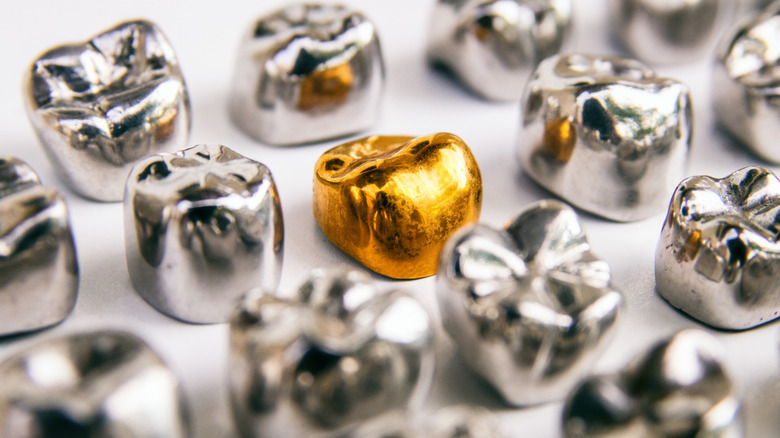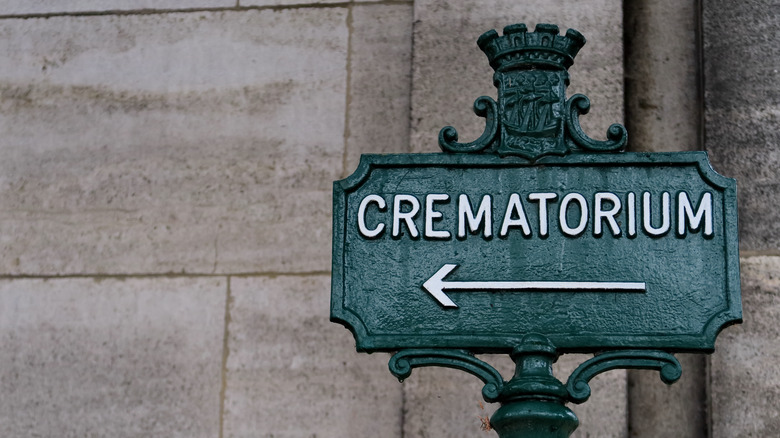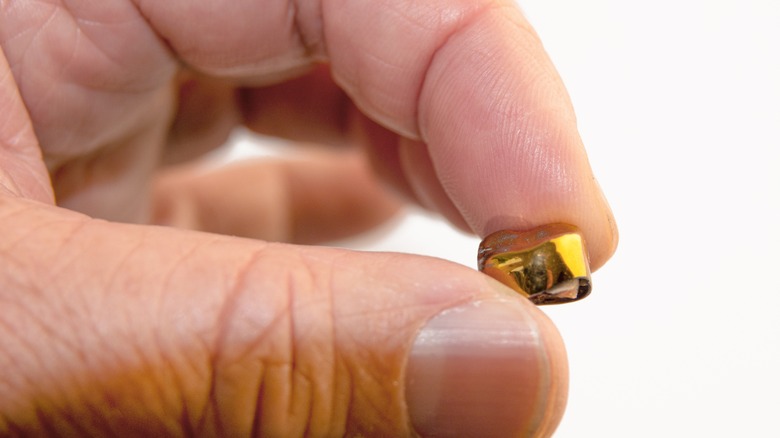Here's What Happens To Gold Teeth During Cremation
Gold teeth are sometimes found on rappers, but in the United States, they're also a common feature of many people who have had dental work. Gold crowns, or metallic covers that are placed over teeth, can be used if a tooth is weak, cracked, or has a root canal, according to Colgate. Though gold crowns don't necessarily easily blend in with your natural teeth, they are considered quite strong and can help improve the longevity of your teeth.
You might think that the fact they're made of gold makes them expensive. And it certainly is pretty pricey to get a gold crown; depending on various factors, the whole procedure can cost between $1,000 and $1,500, according to Low Country Family Dentistry. That's a pretty hefty price tag, though for many people, it might be worth it to eliminate your pain and save your tooth. Still, later in life, you might find yourself wondering about the value of the crowns and fillings in your mouth. Some people have even hoped to recover gold crowns after their loved ones are cremated. But your loved ones can't just pluck the remains of your gold crowns from your ashes.
How human remains are cremated
Cremation is becoming a more and more popular way to dispose of remains, per Lincoln Heritage Funeral Advantage. Cremation is not equally popular across all cultures: Hindus, for example, believe bodies must be cremated, while some Abrahamic religions discourage cremation (via How Stuff Works). But more people are turning to cremation, in part because it can be cheaper and quicker than burial.
The process of cremation is ultimately quite simple. Battery-powered medical devices are removed from the body prior to cremation, according to Lincoln Heritage Funeral Advantage. The body is subsequently placed into a box and inserted into a cremation chamber, where the body is buffeted by flames. The interior of the cremation chamber can heat up to as much as 1800 degrees Fahrenheit, according to the Funeral Consumers Alliance of Arizona. Once the soft tissue has burned away, the bones and any other leftover material is removed from the furnace and pulverized. This material is then returned to the loved ones of the deceased.
What happens to gold teeth during cremation?
But what happens to the objects in your body that won't burn in the fires of the crematorium? There are plenty of metal objects that you might find in your body, including surgical pins, that survive the heat. After the body is burned, crematorium workers will go through the remains and remove any metal items (via Lincoln Heritage Funeral Advantage). These items are collected and donated for recycling. Metals like titanium, cobalt, and palladium are valuable and can be reused in some form, though they can't be used again in someone else's body (per Funerals Your Way).
But gold crowns are unlikely to be among these items. As the Funeral Consumer Alliance of Arizona points out, crematoriums can reach temperatures of between 1400 and 1800 degrees Fahrenheit, and gold melts between temperatures of 1600 to 1900 degrees Fahrenheit. Most gold actually melts in the crematorium, making it hard, if not impossible, to recover.
So can you get your gold back before the body is cremated? Maybe, but it's not really cost effective. Only licensed dentists are allowed to remove crowns or teeth from dead bodies, according to The Co-op Funeral Home, and they usually charge between $650 and $800 for their services, while the material in most gold crowns is only worth about $50. Many dentists may also be uncomfortable performing this sort of procedure on a cadaver, as that same source notes.


